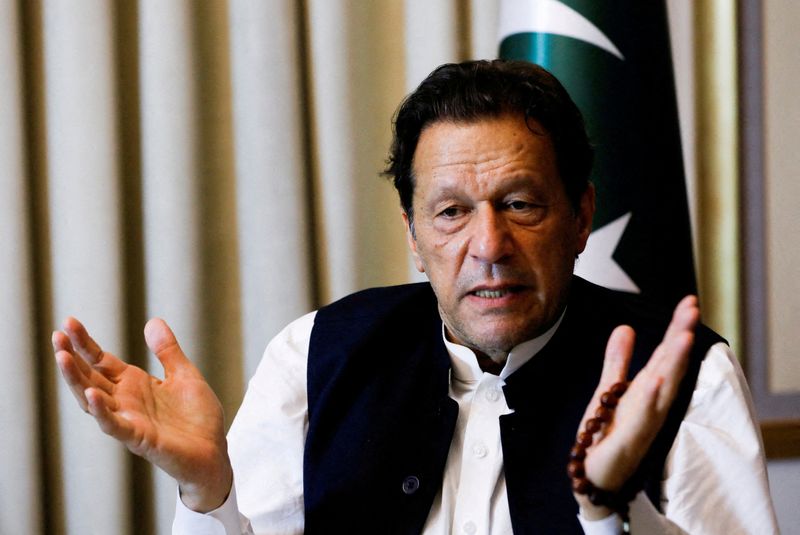Pakistan sets election for January, likely minus Imran Khan
2023.09.21 08:54
2/2

© Reuters. FILE PHOTO: Former Pakistani Prime Minister Imran Khan, gestures as he speaks with Reuters during an interview, in Lahore, Pakistan March 17, 2023. REUTERS/Akhtar Soomro/File Photo
2/2
By Asif Shahzad
ISLAMABAD (Reuters) -The Election Commission of Pakistan (ECP) on Thursday announced a general election for January, almost three months later than scheduled, removing political uncertainty over the timing to help salvage a falling economy.
Elections in the politically and economically troubled South Asian nation were due to be held in November, but were delayed due to fresh demarcation of constituencies under a new census.
An ECP statement said the vote will take place late in January after the conclusion of a process that includes filing nomination papers, appeals and campaigning.
Pakistan is currently being run by a caretaker government under interim Prime Minister Anwaar ul Haq Kakar that is meant to oversee a general election. Originally, elections were to be held within 90 days of the dissolution of the lower house of parliament in August.
The election commission has already questioned the impartiality of the caretaker government led by Kakar, who comes from a pro-military party, saying it appears to be aligned with the opponents of jailed former Prime Minister Imran Khan.
The powerful armed forces have ruled the country for over three decades of its 76-year history and wield enormous influence in politics, including making and breaking civilian governments.
Election results are rarely accepted across the board in Pakistan and perceptions of bias could cast a further shadow over the credibility of the process.
Despite the delay, the announcement eases political uncertainty about when the polls would be held as the country struggles to stay on a narrow stabilisation path under a $3 billion bailout plan by International Monetary Fund (IMF).
Analysts and political parties have been demanding that the elections be held as soon as possible to boost confidence in the ailing $350 billion economy, which is currently suffering from high inflation, low growth and a weak currency.
The Asian Development Bank also endorsed this view in a report this week, saying a smooth election process would help bring the economy back on track.
Pakistan’s benchmark index KSE100 shot up more than 550 points immediately following the announcement, closing 0.7% up.
“News on the election is a major positive, which is expected to restore investor confidence in the system,” said Fahad Rauf, head of research at Ismail Iqbal Securities.
Conversely, Pakistan’s dollar-denominated government bonds slipped by as much as 1 cent on Thursday after the announcement that the elections will be delayed.
WHO ARE THE MAIN CONTENDERS?
As it stands, former premier Khan, the main opposition leader, cannot fight this election after he was barred from public office for five years after a corruption investigation.
Khan’s Pakistan Tehreek-e-Insaf (PTI) will hope to exploit supporters’ sympathy and anger and repeat its 2018 victory. But amidst a continuing standoff with the military, the PTI’s prospects hinge on a detente with the generals, which looks unlikely.
There are two other main contenders to lead the next government: the Pakistan Muslim League-Nawaz (PML-N) of the last prime minister Shehbaz Sharif and the Pakistan Peoples Party (PPP).
Three-time premier Nawaz Sharif, the brother of Shehbaz and whose PML-N was the senior partner in the last coalition government, is seeking a return from exile. But with a corruption conviction against him still in force, Shehbaz remains a front runner to return to power.
Bilawal Bhutto Zardari, 34, the young chairman of the PPP and son of former prime minister Benazir Bhutto, is another key candidate. He made waves locally and in foreign capitals in his first government job as foreign minister in the outgoing government, and is widely seen as a future premier.








